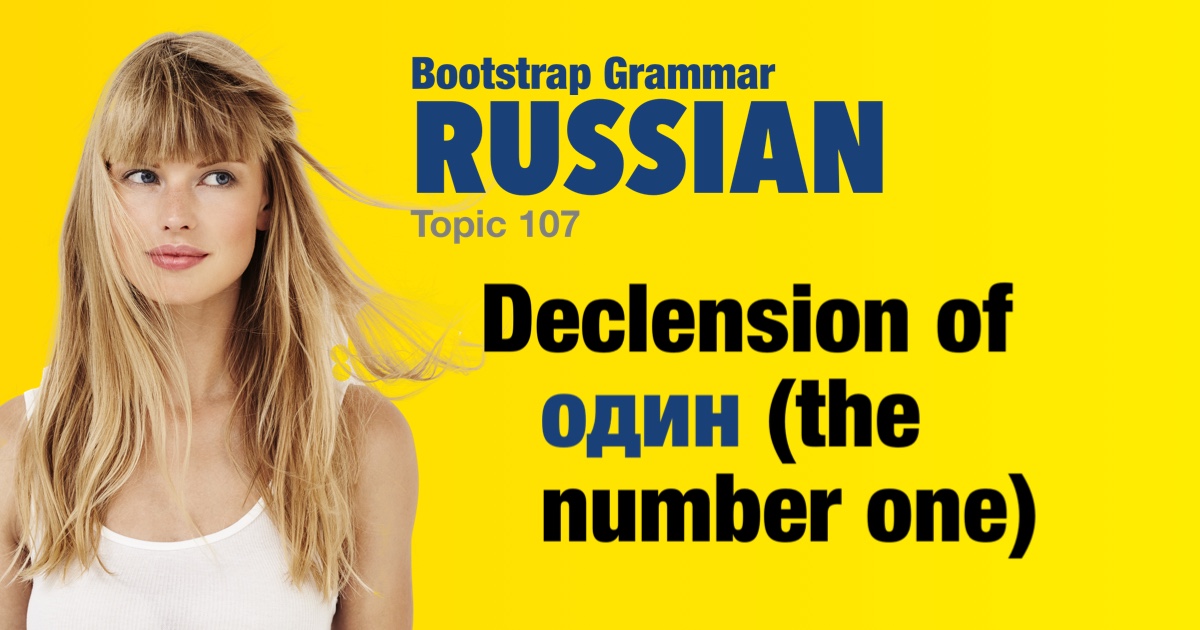Russian grammar - Declension of один (the number one) |
|||
|
|||
When objects are numbered in Russian, the number itself needs to take an appropriate grammatical case. In a sense the number is treated like an adjective. But numbers have their own way of declining according to grammatical case. In this topic we cover the number один in the nominative, prepositional, accusative (animate and inanimate) and genitive cases for each of the genders. • Nominative: один (masc.), одна (fem.), одно (neu.), одни (plural) • Accusative animate: одного (masc.), одну (fem.), одно (neu.), одних (plural) • Accusative inanimate: один (masc.), одну (fem.), одно (neu.), одни (plural) • Prepositional: одном (masc.), одной (fem.), одном (neu.), одних (plural) • Genitive: одного (masc.), одной (fem.), одного (neu.), одних (plural) Note that there is also a plural form of один used when counting non-singular objects like очки (eye glasses) and часы (clock). |
| Examples: | |
|
У меня есть одна маленькая чашка.
I have one small cup.
|
|
|
Я говорю об одной маленькой чашке.
I talk about the one small cup.
|
|
|
Я вижу одну маленькую чашку.
I see one small cup.
|
|
|
У него нет даже одной маленькой чашки.
He doesn't have even one small cup.
|
|
|
У него есть один большой стакан.
He has one big glass.
|
|
|
Он говорит об одном большом стакане.
He talks about the one big glass.
|
|
|
Он видит один большой стакан.
He sees one big glass.
|
|
|
Я вижу одного большого слона.
I see one big elephant.
|
|
|
У них нет одного большого стакана.
They don't have one big glass.
|
|
|
У неё одно зелёное яйцо.
She has one green egg.
|
|
|
Она говорит об одном зелёном яйце.
She talks about the one green egg.
|
|
|
Она видит одно зелёное яйцо.
She sees one green egg.
|
|
|
У нас нет ни одного зелёного яйца.
We don't have one green egg.
|
|
|
У него есть одни маленькие часы.
He has one small clock.
|
|
|
Он говорит об одних маленьких часах.
He talks about one small clock.
|
|
|
Он видит одни маленькие часы.
He sees one small clock.
|
|
|
У него нет одних маленьких часов.
He doesn't have one small clock.
|
|
|
Я вижу ещё одного человека вдалеке.
I see another person in the distance.
|
|
|
У меня в машине есть место ещё для одной девушки.
I have room in the car for one more girl.
|
|
|
Мы открыли ещё одну бутылку вина.
We opened another bottle of wine.
|
|
|
Я часто вижу один и тот же сон.
I often have (see) the same dream.
|
|
|
Мы говорим об одном и том же человеке?
Are we talking about the same person?
|
|
|
Они спали в одной и той же комнате.
They slept in the same room.
|
|
 |
|




